

HRIC actively conducts international human rights advocacy through engagement with key international mechanisms, including UN treaty bodies, special procedures, and the Office of the High Commissioner for Human Rights—through civil society submissions to treaty bodies in advance of their periodic reviews of China and the Hong Kong SAR and monitoring of these reviews; provision of supplemental information; and thematic submissions to Special Rapporteurs. HRIC also delivers policy interventions and testimonies before legislative bodies, including the U.S. Congress and parliaments of Canada, the EU, and the UK, as well as special government China commissions such as the U.S. Congressional Executive Commission on China (CECC).
Through statements and resources, HRIC informs civil society actors and stakeholders in diverse sectors on rights issues and developments. See more: China and the United Nations.
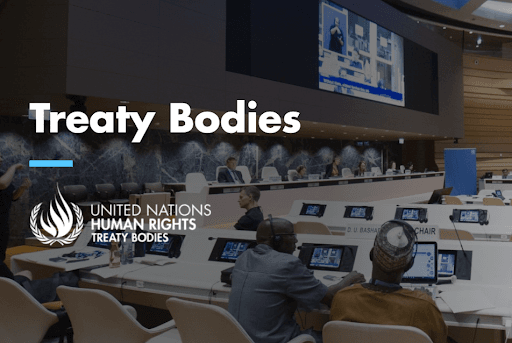
China has signed and ratified key human rights treaties. As a state party, China is obligated to implement the treaties, submit progress reports to the expert committees overseeing implementation, and undergo periodic reviews by these committees. These treaties include:
- Convention against Torture and Other Cruel, Inhuman or Degrading Treatment or Punishment (CAT): EN, CH
- International Covenant on Civil and Political Rights (ICCPR, applicable to the Hong Kong SAR but not mainland China): EN, CH
- International Convention on the Elimination of All Forms of Racial Discrimination (CERD): EN, CH
- Convention on the Elimination of All Forms of Discrimination against Women (CEDAW): EN, CH
- Convention on the Rights of Persons with Disabilities (CRPD): EN, CH
- Convention on the Rights of the Child (CRC): EN, CH
- International Covenant on Economic, Social, and Cultural Rights (ICESCR): EN, CH
Each review cycle begins with the submission of a progress report by China. HRIC contributes to these review cycles by providing input into the Lists of Issues (LOIs) that Committees prepare following China’s submission of its progress reports; making submissions in advance the reviews raising our concerns and presenting our analyses and recommendations; participating in briefings with Committee experts; monitoring the reviews; and providing additional information to the experts.
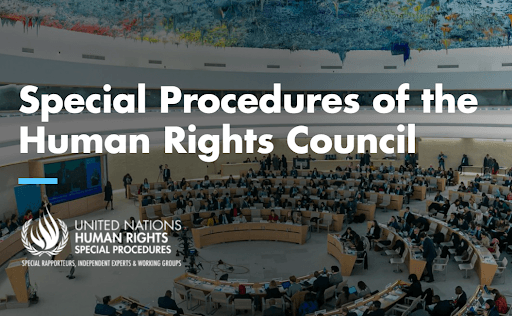
HRIC makes regular submissions to UN Special Procedures that includes Special Rapporteurs or Independent Experts, and Working Groups—with mandates to report and monitor human rights from a thematic or country-specific perspective. HRIC’s submissions highlight concerning developments that represent serious deterioration in fundamental rights in mainland China and the Hong Kong SAR, including issues relating to the independence of judges and lawyers; torture and other cruel, inhuman or degrading treatment or punishment; the rights to freedom of peaceful assembly and of association, the promotion and protection of freedom of opinion and expression, and the right to education and academic freedom.
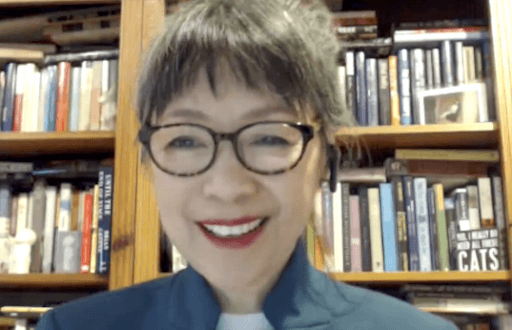
Sharon Hom delivers intervention at the European Parliament Subcommittee on Human Rights’ Exchange of Views on the Comprehensive Agreement on Investment (CAI) February 25, 2021 (Hom at 13:50:28-14:12:54)
“An agreement without human rights clauses or obligations in effect provides a blank check for an authoritarian regime and, frankly, leaves the companies to their own devices to address, ignore, or be complicit in human rights violations. (Text)
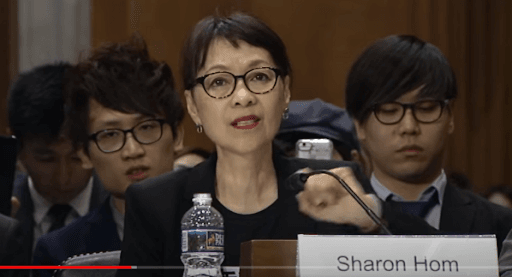
Sharon Hom testifies at the Congressional-Executive Commission on China (CECC) hearing: “Hong Kong’s Summer of Discontent and U.S. Policy Responses” September 17, 2019 (Hom at 48:10-55:39)
“In this historic battle, they are not only fighting for the democratic future of 7.4 million Hong Kong people, but also holding the regional and global frontline on preserving human dignity and rights for all people. (Text)
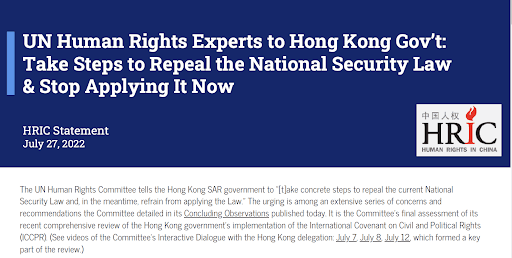
UN Human Rights Experts to Hong Kong Gov’t: Take Steps to Repeal the National Security Law & Stop Applying It Now
July 27, 2022
HRIC statement on the UN Human Rights Committee’s Concluding Observations (following its ICCPR review of the Hong Kong SAR), which included a recommendation, among others, that the Hong Kong SAR government repeal the National Security Law.
“The overarching message from the Committee is this: the Hong Kong SAR needs to put a stop to the repressive measures that have gutted a once-vibrant civil society. . . . The Concluding Observations provide a clear international human rights-centered framework in which to assess and address what’s happening in Hong Kong—against the jaw-dropping, fact-challenged picture and narrative presented by the Hong Kong delegation during the dialogue.
—Sharon Hom, Executive Director of HRIC
ATTACHMENT: “2022.07.27_HRIC Statement_CCPR HK_Concl Obs_INFO”
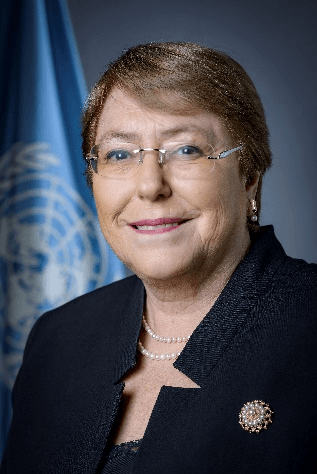
UN Rights Chief Reports on Her Visit to China: What’s Wrong with This Picture?
May 28, 2022
HRIC statement on the end-of-mission statement by the UN High Commissioner for Human Rights at the conclusion of her visit to China.
“Surely, in this time of human rights crisis in China, the High Commissioner’s visit cannot just be a listening and sharing of concerns exercise. . . . The urgent need for concrete measures to promote rights progress demands more than the ‘outcomes’ announced: the creation of yet more ‘engagement’ exercises that lack benchmarks, accountability, and inclusion of meaningful civil society participation.
—Sharon Hom, Executive Director of HRIC
ATTACHMENT: “2022.05.28_HRIC STATEMENT_BACHELET CH VISIT_EN FINAL_LOGO”
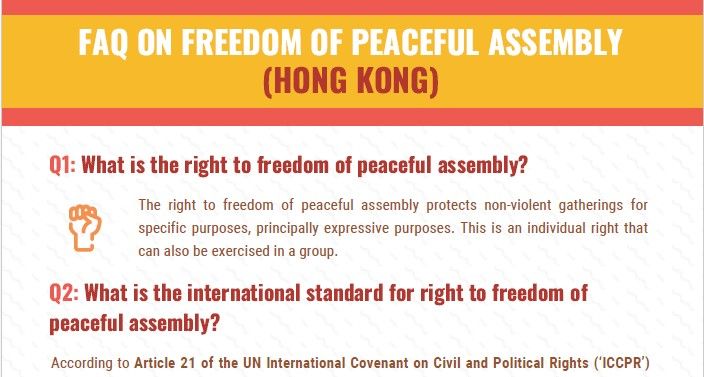
HRIC FAQs ON FREEDOM OF PEACEFUL ASSEMBLY (HONG KONG)
August 2023
Why is the right to freedom of peaceful assembly important?
According to General Comment No. 37 (2020) by the Human Rights Committee, the right to freedom of peaceful assembly helps to recognize and realize a wide range of other rights,
including economic, social, and cultural rights, which is of particular importance to marginalized groups. The full protection of the right to freedom of peaceful assembly is only possible when other, often overlapping rights are protected, such as freedom of expression, freedom of association, and political participation. Failure to respect and ensure the right of peaceful assembly is typically a marker of repression.
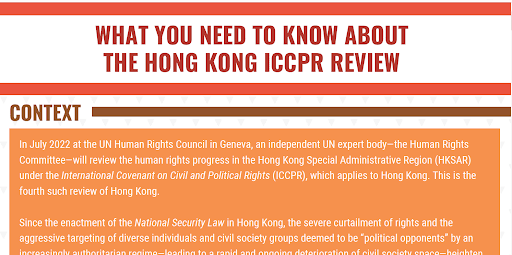
HRIC FAQs: What You Need to Know about the Hong Kong ICCPR Review
July 2022
On Hong Kong’s first review under the International Covenant on Civil and Political Rights (ICCPR) since the imposition of the Law of the People’s Republic of China on Safeguarding National Security in the Hong Kong Special Administrative Region (NSL) in June 2020.
HRIC’s recommendation:
“[U]nless there is a sharp turn towards constructive engagement by the Hong Kong government, the Committee needs to apply a concrete indicator of the State party’s progress and a benchmark to incentivize compliance with the Covenant. Continued blatant failure on the Hong Kong government’s part to meaningfully address challenges and adopt concrete measures [to comply with its obligations under the ICCP] should be reflected in the Committee’s final assessment.
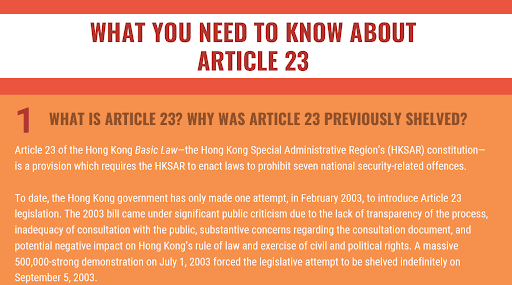
HRIC FAQs: What You Need to Know about Article 23
July 2022
Article 23 of the Basic Law requires Hong Kong to enact a national security law for the Hong Kong SAR. On July 1, 2003, a massive 500,000-strong demonstration forced an earlier legislative attempt to be shelved indefinitely. Any proposed Article 23 bill must comply with international standards on security legislation and protection of rights, and any derogations from rights must comply with international standards.